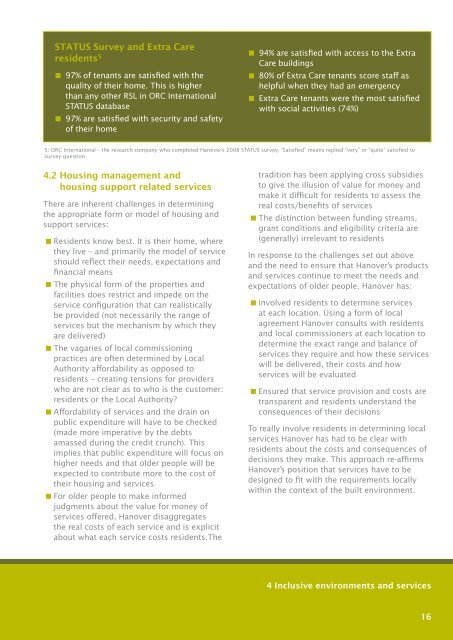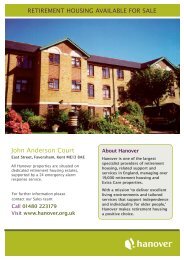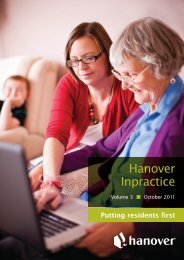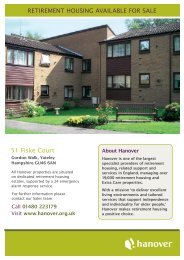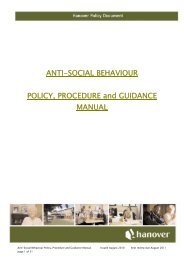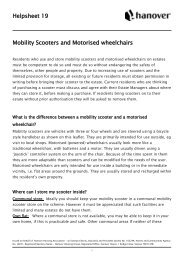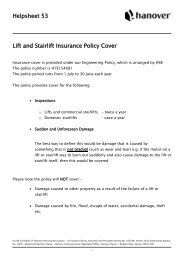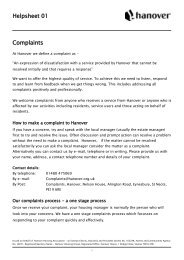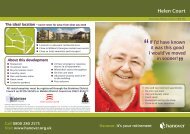20 Years of Extra Care: A Review - Hanover
20 Years of Extra Care: A Review - Hanover
20 Years of Extra Care: A Review - Hanover
You also want an ePaper? Increase the reach of your titles
YUMPU automatically turns print PDFs into web optimized ePapers that Google loves.
STATUS Survey and <strong>Extra</strong> <strong>Care</strong><br />
residents 5<br />
• 97% <strong>of</strong> tenants are satisfied with the<br />
quality <strong>of</strong> their home. This is higher<br />
than any other RSL in ORC International<br />
STATUS database<br />
• 97% are satisfied with security and safety<br />
<strong>of</strong> their home<br />
• 94% are satisfied with access to the <strong>Extra</strong><br />
<strong>Care</strong> buildings<br />
• 80% <strong>of</strong> <strong>Extra</strong> <strong>Care</strong> tenants score staff as<br />
helpful when they had an emergency<br />
• <strong>Extra</strong> <strong>Care</strong> tenants were the most satisfied<br />
with social activities (74%)<br />
5: ORC International – the research company who completed <strong>Hanover</strong>’s <strong>20</strong>08 STATUS survey. “Satisfied” means replied “very” or “quite” satisfied to<br />
survey question.<br />
4.2 Housing management and<br />
housing support related services<br />
There are inherent challenges in determining<br />
the appropriate form or model <strong>of</strong> housing and<br />
support services:<br />
• Residents know best. It is their home, where<br />
they live – and primarily the model <strong>of</strong> service<br />
should reflect their needs, expectations and<br />
financial means<br />
• The physical form <strong>of</strong> the properties and<br />
facilities does restrict and impede on the<br />
service configuration that can realistically<br />
be provided (not necessarily the range <strong>of</strong><br />
services but the mechanism by which they<br />
are delivered)<br />
• The vagaries <strong>of</strong> local commissioning<br />
practices are <strong>of</strong>ten determined by Local<br />
Authority affordability as opposed to<br />
residents – creating tensions for providers<br />
who are not clear as to who is the customer:<br />
residents or the Local Authority?<br />
• Affordability <strong>of</strong> services and the drain on<br />
public expenditure will have to be checked<br />
(made more imperative by the debts<br />
amassed during the credit crunch). This<br />
implies that public expenditure will focus on<br />
higher needs and that older people will be<br />
expected to contribute more to the cost <strong>of</strong><br />
their housing and services<br />
• For older people to make informed<br />
judgments about the value for money <strong>of</strong><br />
services <strong>of</strong>fered, <strong>Hanover</strong> disaggregates<br />
the real costs <strong>of</strong> each service and is explicit<br />
about what each service costs residents.The<br />
tradition has been applying cross subsidies<br />
to give the illusion <strong>of</strong> value for money and<br />
make it difficult for residents to assess the<br />
real costs/benefits <strong>of</strong> services<br />
• The distinction between funding streams,<br />
grant conditions and eligibility criteria are<br />
(generally) irrelevant to residents<br />
In response to the challenges set out above<br />
and the need to ensure that <strong>Hanover</strong>’s products<br />
and services continue to meet the needs and<br />
expectations <strong>of</strong> older people, <strong>Hanover</strong> has:<br />
• Involved residents to determine services<br />
at each location. Using a form <strong>of</strong> local<br />
agreement <strong>Hanover</strong> consults with residents<br />
and local commissioners at each location to<br />
determine the exact range and balance <strong>of</strong><br />
services they require and how these services<br />
will be delivered, their costs and how<br />
services will be evaluated<br />
• Ensured that service provision and costs are<br />
transparent and residents understand the<br />
consequences <strong>of</strong> their decisions<br />
To really involve residents in determining local<br />
services <strong>Hanover</strong> has had to be clear with<br />
residents about the costs and consequences <strong>of</strong><br />
decisions they make. This approach re-affirms<br />
<strong>Hanover</strong>’s position that services have to be<br />
designed to fit with the requirements locally<br />
within the context <strong>of</strong> the built environment.<br />
4 Inclusive environments and services<br />
16


